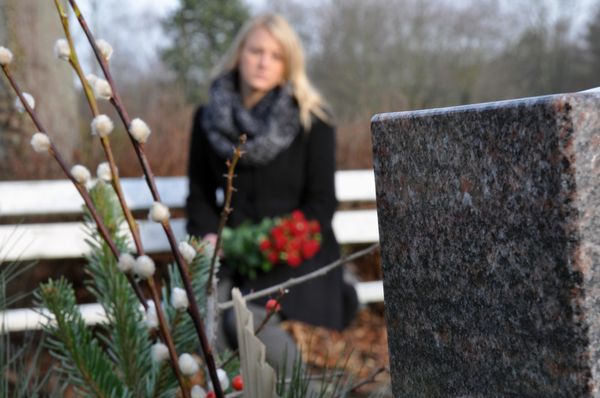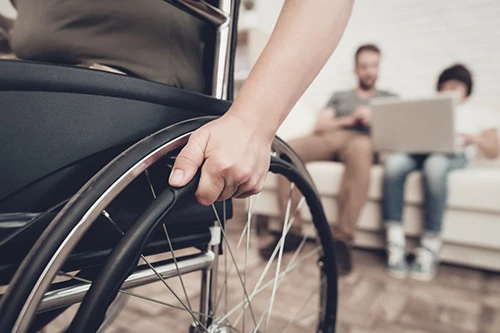Under Florida’s Wrongful Death Act, you and your family can be entitled to monetary compensation if another person or entity causes the death of your loved one. If you are planning on filing a wrongful death claim, it is highly advisable that you hire an experienced wrongful death lawyer in Palm Beach Gardens. Wrongful death claims are more complex than regular personal injury cases. They also involve large sums of money and, thus, you can expect a lot of resistance from the other party.
At Steinberg Law, we have a team of highly dedicated personal injury lawyers who are committed to helping bereaved families get the justice and maximum financial compensation that they deserve. We are prepared to offer all the necessary assistance during this difficult time. Call us today at 877-783-4611 to schedule a free consultation.
How is Wrongful Death Defined in the State of Florida?
Our loved ones are a big part of our lives. Besides sharing a close and loving relationship, we depend on them for our emotional and, in some cases, financial needs. They offer us the support and security we need to get through difficult and great times. Unexpectedly losing a loved one is one of the most painful things that you can endure as a family. This is especially so if the death was caused by someone else’s fault. The pain and anger become heightened when you know that they were needlessly taken away from you. Besides the emotional rollercoaster caused by the sudden loss of a loved one, your family can suffer heavy financial losses as a result of the death.
The definition of wrongful death is contained in the Florida Wrongful Death Act. (Section 768.19) which stipulates that a wrongful death suit can be brought forth by someone in the event that the death of an individual is caused by the negligence, wrongful act, breach of contract, or warranty of any person. In short, wrongful death is any death caused by the legal fault of another party. This can include:
- An intentional or criminal act, for example, assault
- A negligence-related accident, for example, slip and fall
- Medical malpractice
- A defective product
For you to have a wrongful death claim, the following elements must first be established:
- The defendant’s actions amount to negligence, a wrongful act, or breach of warranty
- The defendant’s actions directly led to the death of the deceased
- The defendant’s actions would have entitled the deceased to file a personal injury claim had they not died
Who is Qualified to File A Wrongful Death Claim in Florida?
This is one of the key aspects that make Florida wrongful death claims complex. The state has strict rules as to who is eligible to bring forth a wrongful death lawsuit in a Florida court of law. In reference to Florida’s Wrongful Death Act, only the personal representative of the deceased’s estate can file a wrongful death claim. The personal representative, also known as the executor of the estate, acts on behalf of the estate and the surviving family members. When filing the claim, the personal representative is required to identify and list all potential beneficiaries. These include
- A surviving spouse
- Surviving children or grandchildren (including legally adopted children or grandchildren)
- Surviving parents
- Any other surviving family members who were financially dependent upon the decedent at the time of the decedent’s passing
What Types of Damages are Recoverable?
Damages awardable in a successful Florida wrongful death claim will typically fall into two categories:
Damages awardable to surviving family members
Some of these damages are paid based on the relationship of each of the surviving family members with the deceased. For example, only the surviving spouse and minor children can be awarded damages for loss of companionship. In the absence of a living spouse, adult children may recover damages for lost companionship and guidance.
- The current value of the lost future support and services that would have been provided for by the deceased is calculated from the date of death
- The loss of parental companionship, advice, and guidance
- The loss of the decedent’s companionship and protection
- Mental anguish
- Medical and funeral costs were paid by any surviving family members.
Damages awardable to the estate
- Medical and funeral costs that were paid for by the estate
- Lost earnings by the deceased from the date of injury to the date of death
- Lost benefits and earnings the deceased would have been expected to earn had they not died
Can Surviving Family File For Punitive Damages?
In cases where the defendant’s conduct is deemed to have been reckless, grossly negligent, or malicious, the surviving family members may be awarded punitive damages. These are meant to punish the defendant and discourage the public from repeating such behavior.
Florida has put a cap on punitive damages at three times the amount of compensatory damages or $500,000, whichever is greater.
How is Negligence Proved in a Wrongful Death Case?
While the defendant may have been involved in the death of your loved one, they may not necessarily be held liable for the resulting damages. For you to win your claim and recover compensation, you need to prove the following elements:
Duty of care
First, the plaintiff (personal representative of the estate) should prove that the defendant owed the deceased person a duty of care during that particular situation. What this means is that the plaintiff must prove that the defendant should have acted in a reasonable manner given the circumstances in order to ensure the safety of the deceased. This can include driving safely while on the road, properly maintaining their property or providing adequate warnings, and so on.
Breach of duty of care
Secondly, the plaintiff needs to prove that the defendant violated this duty of care. This means that they didn’t act as they were expected to given the circumstances. For example, failing to observe traffic rules or failing to properly maintain their property and address harmful conditions.
Causation
Thirdly, the plaintiff needs to prove that the decedent’s injury and subsequent death were a direct result of the defendant’s failure to exercise their duty of care. For instance, a defendant may not be held liable for wrongful death if they caused an accident that left the person injured and hospitalized but later died due to medical malpractice or maybe due to being hit by a falling object.
Damages
You can’t recover compensation if you didn’t actually suffer damages. But in this case, if the deceased was a close family member, you are sure to have suffered damages. This can be very easy to prove.
If the plaintiff is able to successfully prove all these elements, then the case will go in your favor.
How Do You Start a Wrongful Death Claim in Florida?
First of all, it is important to note that under Florida’s statute of limitations, one has only two years from the date of death of the deceased to bring forth a wrongful death claim. This means that after this time period lapses, you will no longer have the right to pursue compensation for wrongful death. If you are among the surviving family members of the deceased and wish to file a wrongful death claim, then you should get in touch with an attorney as soon as possible.
In the event that you lose a loved one due to the negligence or unlawful acts of another person or entity, it is important that you hire an attorney to help you understand your rights, guide you through the process, and offer the necessary legal assistance and representation. Here are the key steps involved in a Florida wrongful death claims process:
Designating a personal representative of the estate
As noted, in the state of Florida, only the personal representative of the estate can file a wrongful death claim. Thus, the first step should be to identify the deceased’s personal representative. The probate court will have to grant the personal representative powers to administer the estate. However, if the deceased had not yet appointed a personal representative, the probate court will appoint one.
Identifying all potential beneficiaries
The personal representative has a duty to identify all the potential beneficiaries of the defendant who will be named in the claim. Next, they will need to figure out the number of compensable losses. This also means assigning a dollar value to the pain and suffering and emotional turmoil caused by the death. The input of an experienced Palm Beach Gardens wrongful death attorney will prove to be very helpful in this stage.
Filing the initial claim for damages
Once the above steps have been completed, the next step is to file an initial claim for damages which commences the claims process. This involves sending a demand letter to the at-fault party detailing the damages being claimed as well as any evidence supporting the claim. If it is convincing enough, they may choose to present a settlement offer, an attorney will help you to determine if it is good enough.
Filing the wrongful death lawsuit
If the other party doesn’t present a good enough settlement offer or if they are uncooperative, it is time to take the case to trial. An attorney will help you to file a formal legal claim. Keep in mind that this action has a number of set rules and procedures.
Once you’ve officially filed a wrongful death claim, there will be a number of steps before your case is actually handled in court. These include the discovery stage where both parties collect and exchange evidence. This is followed by mediation as the last attempt to resolve the case out of court.
Court trial
If everything fails, the last step will be to fight your case in court before a judge and/or jury. If you have an experienced and skilled attorney, they will be able to present facts and argue your case in the most compelling manner ensuring that the verdict is made in your favor.
If either party is unsatisfied with the outcome, they can appeal the decision. This means that even if the case ends in your favor, the decision may be appealed, so it is important to arm yourself with an experienced attorney.
What is the Difference Between a Wrongful Death Claim and an Estate Claim?
In a Florida wrongful death claim, both the surviving family members and the estate of the deceased can recover damages following the unlawful death of a person. First, it is important to note that both types of claims can only be filed by the deceased’s personal representative. The personal representative can file a claim on behalf of the estate and they can also file a claim on behalf of the surviving family members.
Generally, a wrongful death claim is filed by the personal representative of the deceased on behalf of the surviving family seeking compensation for damages such as loss of the decedent’s companionship and protection, mental anguish and suffering, loss of support and services provided by the decedent, medical and funeral expenses paid for by a surviving member of the family and so on.
On the other hand, an estate claim can be filed by the personal representative of the estate to help recover financial losses suffered by the estate as a result of the death of the decedent. These can include the medical and funeral expenses directly paid for by the estate, any lost wages and benefits suffered by the deceased between the time of their injury and death, and any future lost benefits and wages lost by the deceased that they would have earned if they had not died.
Reach Out To An Experienced Wrongful Death Lawyer In Palm Beach Gardens!
Coping with the loss of a loved one is painful enough. But combining it with the stress of dealing with the complex Florida legal system and the mischievous insurance companies is incredibly frustrating. If you’ve lost a loved one due to the wrongful acts of another party, it is in your best interest that you seek the assistance of an experienced wrongful death lawyer in Palm Beach Gardens.
Our team has years of experience handling wrongful death claims and we have a proven track record of winning cases and securing maximum compensation for our clients. You shouldn’t have to bear the burden of another person’s actions on your own. Steinberg Law can help you get justice. Call us today at 877-783-4611 to schedule a free consultation.



